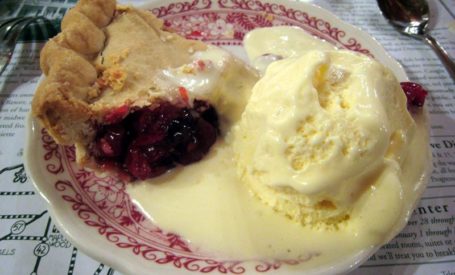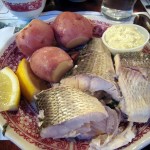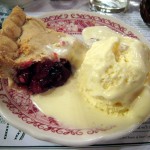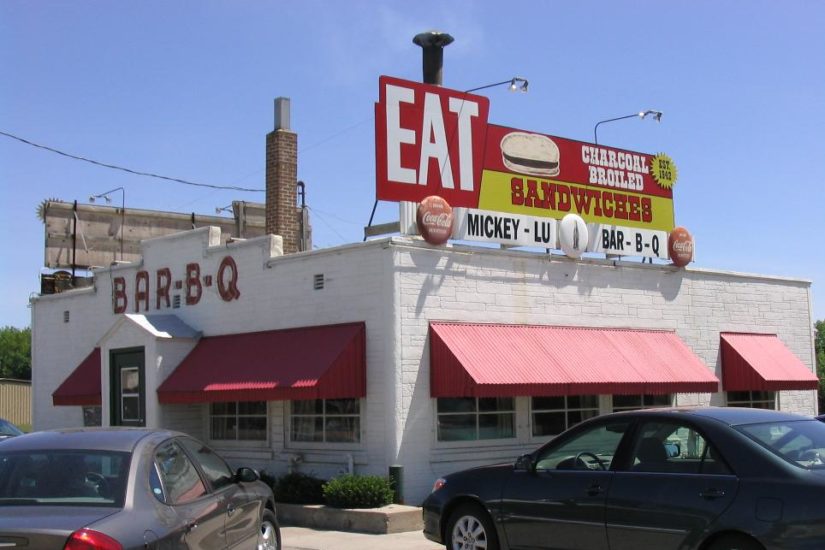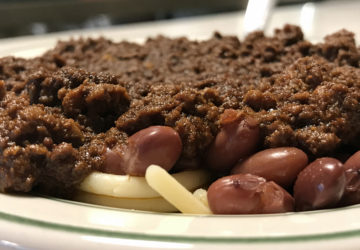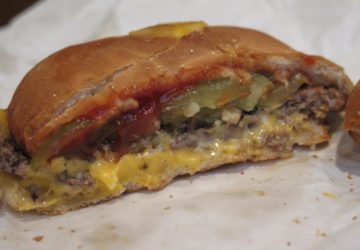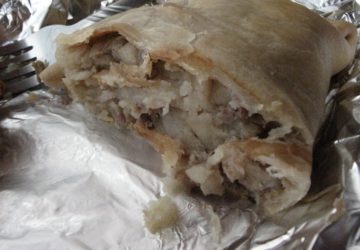
Memorable | One of the Best
White Gull Inn
Review by: Michael Stern
Along the slim peninsula of Door County, Wisconsin, that juts into Lake Michigan east of Menominee and north of Sturgeon Bay, night skies erupt with flames all summer long. On lawns of function halls, in church yards, and at a handful of happy-go-lucky restaurants, fires rise from the extraordinary cooking ritual known as a fish boil.
Steaks of Lake Michigan whitefish along with red potatoes are gathered in separate nets to bubble in a big iron cauldron over crackling hardwood. When the boilmaster decrees the food nearly done, he tosses a pint of kerosene straight into the fire. It explodes like Independence Day, flames engulfing the cook pot and instantly jacking up the heat. In the flash of the blaze, the heavily-salted water boils over and splashes down onto the inferno, nearly dowsing it.
The big bang that signals the end of a fish boil isn’t only for dramatic effect. It ensures the taste of the whitefish. As explained to us long ago by Russ Ostrand, who was boilmaster at the White Gull Inn of Fish Creek for thirty-five years, a ratio of one pound of salt for every two gallons of water in the pot creates a buoyancy that makes ingredients want to float. As the fish cooks in a net, its oils rise and hover at the surface. The volcanic upsurge at the moment of the boil-over forces all the oils and impurities to cascade out over the edge, leaving nothing in the boiling water but clean-flavored fish steaks and potatoes.
For those of us who arrive skeptical about the flavor potential of boiled fish, not to mention vastly oversalted boiled fish, this true-Wisconsin meal is stunning. The thick hunks of whitefish remind us of lobster: milk-moist, dense and fine-textured. Their ephemeral freshwater sweetness is just barely haloed by the presence of salt.
When the flames have subsided, you go indoors and are given a plate crowded with a brace of steaks along with potatoes (which imbibe only a bit more of the salt), then you have the opportunity to drench the whole shebang with ladles full of melted Badger State butter or sprinkle it with lemon and pepper, if preferred. (Most other chefs in Door County also include onions that get boiled along with the potatoes; but the White Gull Inn contends that onions overpower the subtle flavor of the fish.) Every table gets a help-yourself bowl of cole slaw and a variety of seasonal sweet breads – blueberry in the summer, pumpkin and apple in the fall – as well as Swedish limpa rye. The de rigueur dessert is house-baked cherry pie a la mode.
The White Gull Inn is part of Door County history. Built in 1896 as a sanitarium and spa by Dr. Herman Welker, a German immigrant virologist, “The Henriette” (originally named for Welker’s wife) signaled the evolution of Door County from a fisherman’s retreat to a summer resort. Whether or not Dr. Welker was aware of the locals’ pyrotechnic style of cooking fish is unknown, for he had different plans for guests. Dr. Welker’s health regime included swimming and meditation and groaning-board meals of roast pork, wiener schnitzel, and cabbage followed by sweet cakes piled with whipped cream.
Note: At the White Gull Inn, fish boils are done three times a night on Wednesday, Friday, Saturday, and Sunday throughout the summer. Reservations well in advance are almost always necessary.
Directions & Hours
Information
| Price | $ |
| Seasons | All |
| Meals Served | Dinner |
| Credit Cards Accepted | Yes |
| Alcohol Served | Yes |
| Outdoor Seating | No |
What To Eat
White Gull Inn Recipes
Discuss
What do you think of White Gull Inn?




